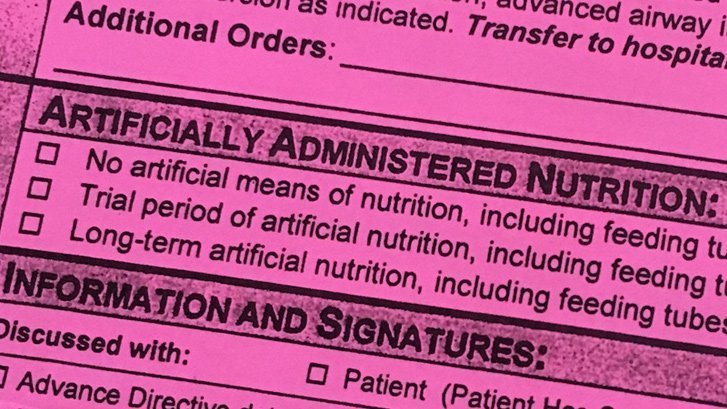Susan Hickman, PhD, director of the Indiana University Center for Aging Research at Regenstrief Institute, and her colleagues nationwide are stressing the importance of including orders about artificial nutrition preferences on POLST (Provider’s Orders for Life Sustaining Treatment) forms.
POLST forms allow people who are seriously ill or frail to designate what specific medical treatments they receive when they are unable to speak for themselves. Those treatments can include preferences for intubation, cardiopulmonary resuscitation, and other similar treatments. The POLST form medical orders are different than “do not resuscitate” orders because they provide more information than just that the patient does not want to be resuscitated.
Dr. Hickman and coauthors wrote a letter to the editor to the Journal of the American Geriatrics Society on behalf of the National POLST Paradigm regarding the decision of Oregon’s POLST Program to remove feeding tube orders from the POLST. Dr. Hickman and the national organization believe that any changes to the form need to be supported by robust data. 
The National POLST Paradigm is a voluntary collaborative of state leaders and advisors that provides guidance and support to state POLST programs. Forty-three states are members of this organization.
After reviewing the evidence, discussing clinical implications, and reflecting on the philosophical foundation of the POLST Paradigm, the state program governance group overwhelmingly agreed that the orders reflecting preferences for artificial nutrition belongs on the form.
Why artificial nutrition orders should remain on POLST
Dr. Hickman and her colleagues present several reasons that decisions about artificial nutrition are an important issue for seriously ill patients who are near the end of life. POLST is an advance care planning tool that supports discussion and documentation about preferences for life-sustaining treatments, including feeding tubes. POLST orders are designed to guide treatment during both emergencies and non-acute changes in condition.
The authors are concerned that if the POLST form excludes orders about artificial nutrition, discussions will be less likely to occur and there will be no documentation of preferences available. Finally, they stress that major changes to a state’s POLST form should be based on robust data and that Oregon’s original letter explaining its decision to remove the artificial nutrition section from Oregon’s POLST form lacked definitive evidence.
Dr. Hickman and other leaders from the National POLST Paradigm hope this letter brings awareness to the purpose and goals of the POLST program and the importance it plays in allowing people with serious injuries or frailties to choose how to live and be cared for.
Dr. Hickman is a founding member of the National POLST Paradigm. In addition to her roles with the organization and with Regenstrief, Dr. Hickman is a professor at the Indiana University School of Nursing and Cornelius and Yvonne Pettinga Professor of Aging Research at Indiana University School of Medicine. She is also codirector of the IUPUI Research in Palliative and End-of Life Communicating and Training (RESPECT) Signature Center.
Coauthors on the letter to the editor are Amy Vandenbroucke, J.D., Executive Director of the National POLST Paradigm; John Carney, MEd, Center for Practical Bioethics; Victor Sandler, M.D., University of Minnesota Medical School; Hillary D. Lum, M.D., PhD, University of Colorado School of Medicine; and Bernard J. Hammes, PhD, Respecting Choice, A Division of CTAC Innovations.











